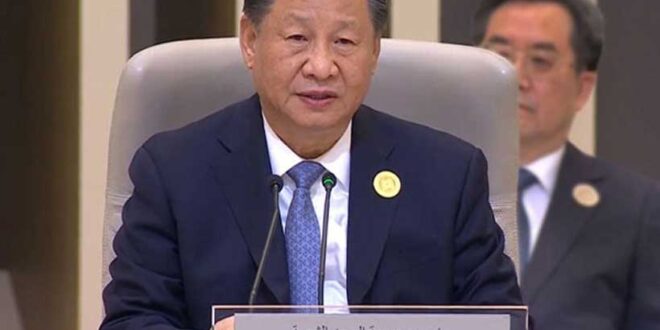The recent escalation in the Israel-Palestine conflict has revealed serious limitations in China’s long-standing Middle East strategy, forcing Beijing to confront uncomfortable realities in a region known for deeply entrenched rivalries.
Over the past decade, China has carefully positioned itself as an economic partner and diplomatic player in the Middle East, walking a tightrope between regional powerhouses like Iran, Saudi Arabia, and even Israel. Through initiatives like the $400 billion trade deal with Iran and rising investments in the Gulf Cooperation Council (GCC) states, China has pursued both economic dominance and a political narrative of nonalignment with the U.S. Yet, the violence following the October 7 Hamas attack has tested Beijing’s ability to stay neutral, as its cautious diplomatic statements have not masked the difficult choices ahead.
A Diplomatic Balancing Act
Historically, China’s diplomatic posture in the Middle East has been ideologically driven and careful to avoid direct alignment with the U.S. or any single Middle Eastern power. This stance has allowed it to serve as a bridge between Iran and the GCC, winning favor among rivals like Saudi Arabia and Iran. However, in response to the current crisis, China’s messaging has diverged sharply, often critical of Israel without addressing the violence initiated by Hamas. In early October, Chinese Foreign Minister Wang Yi called Israel’s actions in Gaza “beyond the scope of self-defense,” a stance that has risked China’s credibility as a neutral actor.
China’s complex balancing act now seems increasingly strained. Maintaining influence across competing interests in the Middle East—while advancing its anti-U.S. global narrative—is proving more difficult, as Beijing’s alliances reveal fault lines that threaten to derail its broader strategic objectives.
Economic Heft Without Military Commitment
China’s economic ties in the region are robust. Investments in Saudi Arabia, UAE, and Qatar amount to billions, demonstrating Beijing’s interest in building interdependence with the oil-rich GCC. However, these investments come without a military commitment, and China’s small military presence at Djibouti underscores that its regional presence is largely limited to economic interests. This strategic gap leaves China reliant on the U.S. to act as the region’s primary security provider, especially given Iran’s proxy networks.
From a geopolitical perspective, Beijing’s reliance on Iranian oil has been significant, with nearly 90% of Iran’s oil exports going to China, yet the balance tilts heavily in China’s favor. Unlike its more reciprocal relationships with Saudi Arabia and UAE, the Chinese-Iranian relationship is marked by Iran’s economic dependence on China. The lack of mutual gain in this relationship highlights how China’s leverage over Iran remains fragile and limited in scope.
Pressure on Regional Relationships
With its Israeli partnership in jeopardy, Beijing’s continued engagement with the GCC is crucial. Major investments, particularly those from Chinese firms like Alibaba in Saudi Arabia and Qatar’s LNG deals, are central to China’s regional economic strategy. The GCC’s capital flows into China also highlight the strategic interdependence these relationships foster.
Yet, despite Beijing’s push for trade denominated in yuan, GCC states are wary of over-reliance on China, especially as U.S. pressure mounts over Chinese investments in the region. For example, UAE’s G42 was compelled to divest from ByteDance due to U.S. scrutiny, highlighting the potential pitfalls of deepening ties with China in a highly polarized global landscape.
Strategic Vulnerabilities
Beijing’s ambitions to act as a balancing power in the Middle East face serious challenges. If tensions escalate further, China may find itself forced to choose between Iran and Saudi Arabia, jeopardizing its diplomatic relationships and strategic goals. Its reliance on regional partnerships has created vulnerabilities that could undermine China’s influence if it missteps, especially as the world watches how it navigates the ongoing crisis in Israel and Palestine.
China’s Middle East strategy, defined by economic investments and ideological posturing, has reached an inflection point. With its stance tested by war, Beijing’s ability to retain credibility as a neutral party may face unprecedented challenges in an increasingly polarized region. The question now is whether China can adapt its approach to avoid being drawn into a geopolitical contest it is ill-prepared to lead.
 Geostrategic Media Political Commentary, Analysis, Security, Defense
Geostrategic Media Political Commentary, Analysis, Security, Defense





